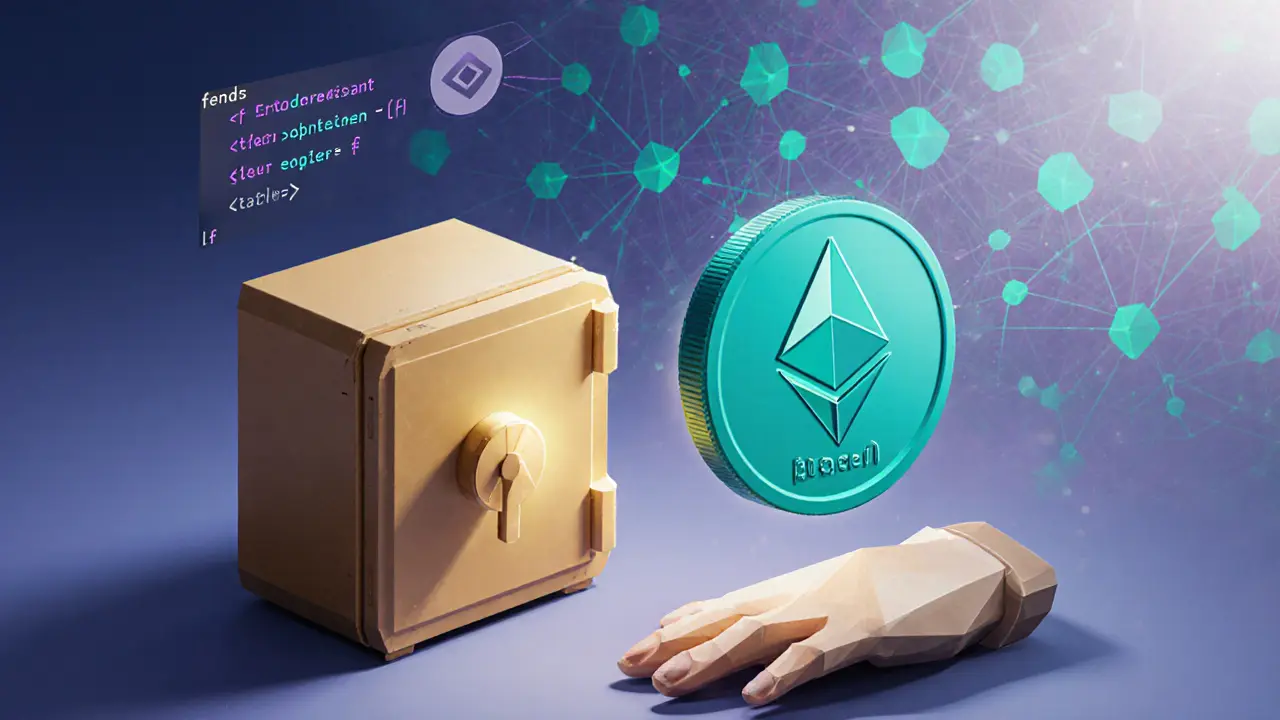How Smart Contracts Transform Financial Agreements

Smart Contract Cost Estimator
Estimate Your Smart Contract Costs
Calculate development, audit, and gas fees for financial smart contracts based on complexity and requirements.
Contract Complexity
Security Requirements
Estimated Costs
Imagine a contract that executes itself the moment conditions are met - no lawyers, no banks, no paperwork. That’s the promise of Smart contracts, digital agreements coded on a distributed ledger. In the next few minutes we’ll explore why smart contracts are reshaping how financial agreements are created, enforced, and settled.
What Is a Smart Contract?
Smart contracts are self‑executing programs that run on blockchain networks. Their code contains simple if‑then logic: when a predefined event occurs, the contract automatically performs the stipulated action. Because the code lives on a decentralized ledger, every participant sees the same immutable version, eliminating the need for a trusted third party.
Why Financial Agreements Benefit More Than Any Other Use‑Case
Financial contracts - loans, swaps, subscription fees, asset transfers - demand speed, accuracy, and trust. Traditional paper contracts rely on intermediaries (banks, lawyers, clearinghouses) to verify performance and enforce payment. Each handoff adds time, cost, and the risk of human error. By moving the agreement onto a blockchain, smart contracts deliver:
- Instant execution: funds move the second conditions are satisfied.
- Zero‑or‑low intermediaries: no escrow officer or clearinghouse needed.
- Transparency: every party can audit the code and the transaction history.
- Immutable record: once deployed, the contract cannot be altered without consensus.
Core Components of a Financial Smart Contract
To understand how a contract works, break it into three parts:
- Financial agreement - the business logic (e.g., "pay $10,000 when delivery is confirmed").
- Blockchain platform - the execution environment. Ethereum is the most widely used, offering a robust virtual machine and a large developer ecosystem.
- Security auditing - a code review by specialists to catch bugs or malicious backdoors before deployment.

Real‑World Financial Use Cases
Below are concrete examples where smart contracts have already replaced manual processes.
- Automated lending on DeFi platforms: MakerDAO locks collateral in a smart contract and issues a stablecoin (DAI) automatically. Repayment triggers the contract to release the collateral without any human intervention.
- Subscription billing: A SaaS provider can embed a smart contract that debits a crypto wallet every month as long as the user maintains a valid balance, automatically suspending service on failure.
- Asset transfer: When a seller confirms shipment of a physical good, a sensor or IoT device can trigger a contract to release cryptocurrency payment to the seller’s address.
- Trade finance: Letters of credit can be digitized, so that once customs clears the cargo, payment is released instantly, reducing the typical 30‑day lag.
Smart Contracts vs. Traditional Contracts - A Quick Comparison
| Feature | Smart Contract | Traditional Contract |
|---|---|---|
| Execution | Automatic upon condition fulfillment | Manual, often requiring sign‑off |
| Intermediaries | None or minimal (e.g., blockchain validators) | Banks, lawyers, notaries |
| Cost | Gas fees (often <$0.10) plus development cost | Legal fees, processing fees, often >1% of transaction |
| Speed | Seconds to minutes depending on network load | Days to weeks |
| Security | Cryptographic guarantees; vulnerable to code bugs | Relies on institutional trust; susceptible to fraud |
| Immutability | Once deployed, cannot be altered without consensus | Amendable via addenda or court orders |
Risk Areas and How to Mitigate Them
Smart contracts are powerful, but they inherit the classic software risk: bugs become money‑loss bugs. The most common pitfalls include:
- Logic errors: A misplaced
require()statement could let a bad actor withdraw funds. - Re‑entrancy attacks: The infamous DAO hack exploited a contract that called back into itself before state updates.
- Oracles failure: If a contract depends on external data (e.g., price feeds) and the oracle is compromised, the contract executes on false data.
Mitigation strategies:
- Hire reputable auditing firms that specialize in blockchain security.
- Use battle‑tested libraries (e.g., OpenZeppelin) for common functions.
- Employ decentralized oracle networks (e.g., Chainlink) rather than single‑point data sources.
- Deploy contracts in a staged manner: test on a public testnet, then a limited‑scope mainnet launch.

Step‑by‑Step Guide to Deploy a Financial Smart Contract
- Define the agreement: List all parties, conditions, and outcomes in plain language.
- Translate to code: Write Solidity (or another language) that encodes the logic. Include safety checks and event logs.
- Test locally: Use frameworks like Hardhat or Truffle to simulate every scenario.
- Unit tests for each function.
- Integration tests that mimic real‑world flow.
- Audit the contract: Send the code to a security auditor. Address every finding before proceeding.
- Deploy to the blockchain: Choose a network (Ethereum mainnet, Polygon, or a permissioned chain) and pay the gas fee.
- Monitor post‑deployment: Set up alerts for unexpected events, and be ready to freeze or upgrade via a proxy pattern if needed.
Future Outlook - Where Smart Contracts Are Heading in Finance
Adoption is still in its early phase, but three trends are clear:
- Hybrid contracts: Combining on‑chain logic with off‑chain legal clauses, allowing regulators to enforce remedies when code cannot capture nuance.
- Enterprise blockchains: Companies like IBM and ConsenSys are building permissioned networks that retain smart‑contract capabilities while meeting compliance requirements.
- Interoperability: Protocols such as Polkadot and Cosmos aim to let contracts on one chain interact with assets on another, expanding use cases across borders.
For fintech innovators, the message is simple: mastering smart contracts will become as essential as mastering APIs in the next decade.
Frequently Asked Questions
Can smart contracts replace all traditional financial contracts?
Not yet. While they excel at deterministic, condition‑based payments, contracts that require subjective judgment (e.g., good‑faith performance) still need human oversight or hybrid solutions.
What blockchain is best for financial agreements?
Ethereum remains the leader due to its mature tooling and large developer pool. However, for lower fees and faster finality, many firms choose Polygon, Avalanche, or permissioned chains like Hyperledger Fabric.
How much does it cost to develop a smart contract?
Development fees vary widely-from a few thousand dollars for a simple token swap to $50,000+ for complex multi‑party DeFi protocols. Add audit costs (typically $10,000-$30,000) and deployment gas fees.
Are smart contracts legally enforceable?
Jurisdictions are catching up. In the U.S., the Uniform Electronic Transactions Act and various state statutes recognize digital signatures and code‑based agreements, but clarity varies by region.
What are the biggest security pitfalls?
Re‑entrancy, integer overflow, and faulty oracle data are the top three. Using vetted libraries and multi‑source oracles drastically reduces risk.

Jordan Collins
October 14, 2025 AT 08:25Smart contracts definitely cut down on intermediary fees, but the development and audit costs can still be significant. When choosing a platform, you have to weigh gas fees against security guarantees. Ethereum offers the broadest tooling, yet Layer‑2 solutions like Polygon bring cheaper transactions. A well‑audited contract can mitigate many of the common attack vectors listed in the article. Overall, the trade‑off analysis should start with your specific use‑case requirements.
Andrew Mc Adam
October 22, 2025 AT 10:01Yo, the whole idea of contracts that just *magically* execute themselves is like sci‑fi meets finance! But honestly, you cant just drop a piece of code on Mainnet and expect perfection – the bugs are realz. I remember a friend who lost a few ETH cuz of a re‑entrancy slip, total facepalm. The article nailed the risk part, especially the oracle drama – those data feeds can turn into nightmare. Still, the potential speed boost is wicked exciting, especially for cross‑border deals. Just make sure you get a solid audit before you go live, or you'll be payin' the price.
Marques Validus
October 30, 2025 AT 10:37Yo the gas on Ethereum can burn a hole in your wallet but the speed payoff is lit
Michael Bagryantsev
November 7, 2025 AT 12:13Great points about the pitfalls, especially the re‑entrancy example. For developers just starting out, using OpenZeppelin's library can block many of those classic bugs with minimal code. Also, testing on a testnet like Goerli helps surface edge cases before mainnet deployment. Pairing that with a reputable audit will give you confidence that the contract behaves as intended. It’s all about building layers of safety, not relying on a single line of code.
Jason Clark
November 15, 2025 AT 13:49Sure, because we all have endless amounts of capital to throw at audits, right? In reality, the $20‑$30k audit budgets are the new norm for anything beyond a toy contract. If you can’t justify that expense, you’re probably better off keeping the agreement off‑chain.
Jim Greene
November 23, 2025 AT 15:25Smart contracts are revolutionizing finance in ways we could only dream about a decade ago. 🌟
By encoding payment rules directly into code, they eliminate the endless back‑and‑forth that legal teams endure. 🤝
This automation translates to near‑instant settlement, which is a huge win for high‑frequency traders. ⚡
Moreover, the transparency of a public ledger means every participant can audit the transaction history at any time. 🔍
That level of openness builds trust without the need for a central authority. 🛡️
However, the flip side is that any bug in the contract becomes a public vulnerability. 🐞
The infamous DAO hack still haunts the community and serves as a cautionary tale. 📚
To mitigate such risks, you should always start with battle‑tested libraries like OpenZeppelin. 📦
Conducting thorough unit tests and integration tests on a testnet can catch many logical errors early. 🧪
After code is polished, a professional audit-preferably from a firm with a solid reputation-adds an essential safety net. ✅
Gas fees, while sometimes steep on Ethereum, can be managed by choosing Layer‑2 solutions or alternative chains like Polygon or Avalanche. ⛽
These networks offer dramatically lower fees while retaining most of Ethereum’s security guarantees. 🔒
From a business perspective, the cost‑benefit analysis often favors smart contracts once you factor in the saved intermediary fees. 💰
Real‑world examples like automated DeFi lending and subscription billing already demonstrate the value proposition. 📈
Looking ahead, hybrid contracts that blend on‑chain code with off‑chain legal language will likely bridge the gap for complex agreements. 🔗
So, if you’re building the next fintech product, mastering smart contracts is becoming as essential as mastering REST APIs. 🚀
Mandy Hawks
December 1, 2025 AT 17:01The article invites us to consider not just the efficiency gains but also the ethical dimensions of delegating trust to code. While speed is seductive, we must ask whether immutable contracts can accommodate the nuances of human intent. Perhaps a hybrid approach, where legal recourse complements on‑chain enforcement, offers a balanced path forward.
Brian Elliot
December 9, 2025 AT 18:37When evaluating platforms, keep an eye on the developer ecosystem. A vibrant community means better tooling, faster bug fixes, and more learning resources. That alone can reduce overall project timelines considerably.
Steve Cabe
December 17, 2025 AT 20:13Exactly, and don’t forget that national regulatory stances can sway platform choice. The US still leans heavily on compliance, so a permissioned chain might be the pragmatic route for many enterprises.
shirley morales
December 25, 2025 AT 21:49Smart contracts are hype but not a panacea
Kevin Duffy
January 2, 2026 AT 23:25👍 The hype is real, but it’s all about using the right tool for the job. 🚀
Tayla Williams
January 11, 2026 AT 01:01While the technical advantages of blockchain‑based agreements are evident, one must also consider the jurisprudential implications. The jurisprudence surrounding digital signatures and code‑based contracts varies considerably across jurisdictions, and a thorough legal review is indispensable before deployment.
Jazmin Duthie
January 19, 2026 AT 02:37Oh great, another lawyer to read the code. Because that’s what we needed.
Michael Grima
January 27, 2026 AT 04:13Cool story, bro. Next you’ll tell us pizza can be delivered by drones.
Teagan Beck
February 4, 2026 AT 05:49Haha, maybe when the pizza smart contract finally gets audited! 🍕
Kim Evans
February 12, 2026 AT 07:25For anyone getting started, I’d recommend the following checklist: choose a blockchain, draft the agreement in plain language, translate to Solidity, write unit tests, get an audit, deploy on a testnet, monitor events. Feel free to reach out if you need any pointers 😊